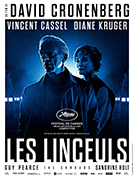The Shrouds

| Original title: | The Shrouds |
| Director: | David Cronenberg |
| Release: | Cinema |
| Running time: | 116 minutes |
| Release date: | Not communicated |
| Rating: |
Mulder's Review
David Cronenberg's The Shrouds, which premiered at this year's Cannes Film Festival, is a dark art-house horror drama that explores the complexities of grief, loss and the ethical implications of technology in the grieving process. The film's complex narrative and minimalist style are typical of Cronenberg and offer a unique and stimulating visual experience.
The Shrouds introduces us to Karsh Relikh, played by Vincent Cassel, an emaciated and grieving entrepreneur. Karsh is the founder of GraveTech, a controversial start-up that installs digital screens on gravestones, enabling mourners to watch their loved ones decompose in real time. This invention, which Karsh proudly shows off to a bewildered date, is his way of staying in touch with his deceased wife, Becca, whose decaying corpse he finds strangely comforting to watch. This unsettling premise sets the stage for a story filled with ethical dilemmas, personal anguish and political intrigue.
Vincent Cassel delivers a convincing performance as Karsh, embodying the character's grief and distress with restrained intensity. Karsh is portrayed as a man whose life revolves around his invention and his wife's fading memory. Vincent Cassel's performance captures the strange comfort Karsh derives from his macabre invention, making his character both pitiful and disturbing. Despite the grim subject matter, Cassel manages to imbue Karsh with a certain degree of humanity, portraying a man trapped in his own grief and obsession.
Diane Kruger plays a dual role in the film, portraying both Becca and her sister Terry. As Becca, Kruger appears in Karsh's flashbacks and hallucinations, often naked and in various stages of decomposition. These haunting visions underscore Karsh's inability to let go, further accentuating his profound grief. As Terry, Kruger delivers a more down-to-earth performance. Terry is a dog groomer who bonds with Karsh, adding another layer of complexity to the story. Kruger's portrayal of Terry brings a touch of warmth to the film's otherwise cold and sterile environment.
Guy Pearce adds a touch of dark humor to the story as Maury, Karsh's brother-in-law. Pearce's character is a conspiracy theorist whose eccentricities contrast with Karsh's somber demeanor. His performance adds depth to the film's exploration of grief and loss, showing how different characters cope with the same tragedy in different ways.
Cronenberg's direction is marked by his trademark minimalism and detachment. The film's aesthetic is austere and monochrome, reflecting the darkness of Karsh's inner world. The sets are spare, the costumes plain, and the general atmosphere is one of emotional and physical decay. This visual style reinforces the film's themes, creating a sense of numbness and detachment that mirrors the protagonist's emotional state.
The Shrouds' narrative is as complex as its themes. Karsh's invention quickly sparks controversy, leading to vandalism in his graveyard and threats from a foreign billionaire. These external conflicts add to Karsh's internal struggle, creating a multi-layered narrative that explores not only personal grief, but also the wider implications of technology and ethics in bereavement. The meandering plot can be hard to follow, with numerous subplots and philosophical questions sometimes diluting the central themes.
One of the film's strengths is its exploration of profound themes such as spirituality, nihilism and the ethical implications of technological advances in grief. Karsh's atheism, juxtaposed with his reverence for the after-death process, adds a layer of complexity to the narrative. Cronenberg uses Karsh's obsession with watching his wife's decomposition to comment on the human need for connection and the efforts we make to maintain it, even beyond death.
However, the film's thematic richness is also its weakness. The myriad philosophical questions and ethical dilemmas presented in The Shrouds can sometimes seem overwhelming and unfocused. The film's slow pace and cold, detached atmosphere can also alienate viewers who prefer more emotionally engaging stories.
Stylistically, The Shrouds is minimalist and monochrome, with a visual aesthetic that reinforces the film's themes of decadence and detachment. Douglas Koch's images are cold and sterile, reflecting the bleakness of Karsh's world. Howard Shore's music, a mixture of hymns and organs, completes the film's somber tone, adding to its overall sense of melancholy.
The Shrouds is a film that is likely to divide audiences. It is a contemplative work that requires patience and empathy to fully appreciate its thematic depth and artistic intent. For those who can engage with its slow pace and detached style, it offers a unique exploration of grief, loss and the ethical implications of technology in mourning. However, the meandering plot and emotionally distant tone may leave others wanting more. David Cronenberg's The Shrouds testifies to his distinctive vision and willingness to push boundaries, but its ability to deliver a compelling narrative and emotional resonance remains a matter of personal interpretation.
The Shrouds
Written and directed by David Cronenberg
Produced by Saïd Ben Saïd, Martin Katz, Anthony Vaccarello
Starring Vincent Cassel, Diane Kruger, Guy Pearce
Music by Howard Shore
Cinematography : Douglas Koch
Edited by Christopher Donaldson
Production companies : Prospero Pictures, SBS International, Saint Laurent Productions
Distributed by Pyramide Distribution (France)
Release date : May 20, 2024 (Cannes), April 30, 2025 (France)
Running time : 116 minutes
Seen on May 25, 2024 at Gaumont Opéra Premier, Hall 1
Mulder's Mark:

